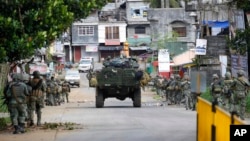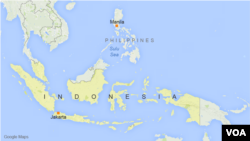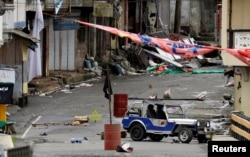Joint patrols by three Southeast Asian countries in the Sulu Sea may be the start of a larger regional effort to keep Islamic militants at bay, officials said Sunday.
The patrols will be conducted by forces from Indonesia, the Philippines and Malaysia, starting with sea operations this month, with air and land patrols starting at a later date.
The initiative in the Sulu Sea, an area bounded by the Malaysian state of Sabah and the southern Philippines, is a “collective agreement that is followed by the operational level,” Indonesian Defense Minister Ryamizard Ryacudu said. It will feature joint command posts and exercises between the trio’s ground forces.
Islamic militants in region
Joint patrols are an attempt “to prevent and protect our border, to close the border so that militants don’t go to other areas,” Ryamizard said. “If the situation escalates and extends to other waters, we would like to request other countries to join.”
Indonesia has the world’s largest Muslim population. Ryamizard was speaking at the Shangri-La Dialogue, a security conference in Singapore attended by defense ministers and experts from 39 countries.
The presence of Islamic militants has been felt in the region. Philippine troops are struggling to end a bloody siege by 500 Islamic State group-aligned extremists in the southern city of Marawi, one of the boldest militant attacks in Southeast Asia in years.
Forty foreigners involved in the Marawi attack may have found a path through the Sulu Sea, said Ricardo David Jr., undersecretary for defense policy at the Philippine Department of National Defense.
“They have a back channels corridor in our country, probably in the area of Sulu Sea and Celebes Sea, that they can proceed to Mindanao and link with the terrorist units in the area,” he said.
The joint patrols are not conducted under the umbrella of the 10-member Association of Southeast Asian Nations, of which Indonesia, the Philippines and Malaysia are part.
“ASEAN is not a military bloc. It is a defense corporation. If there are any issues, we have to find commonalities” out of the organization, Ryamizard said.
Common enemy
Still, the objectives are aligned.
“The very threat we face is a common enemy. Terrorists are the enemy. Especially in ASEAN, we don’t have any differences. I believe this can be a framework for other countries like the Middle East,” he added.
Singapore Defense Minister Ng Eng Hen said that he has offered assistance in the form of an information-sharing center at Changi Naval Base.
China has been asked to contribute its ships. Responding to a question from a member of the Chinese delegation, Ryamizard said: “It is like peace patrols. It is very important to underline that it is joint peace patrols.”
The inclusion of China is sensitive as the country has pitted itself against smaller Southeast Asian neighbors in claiming disputed islands, coral reefs and lagoons in the South China Sea.
The three-day security conference, which ends Sunday, also focused on the nuclear ambitions of North Korea.






